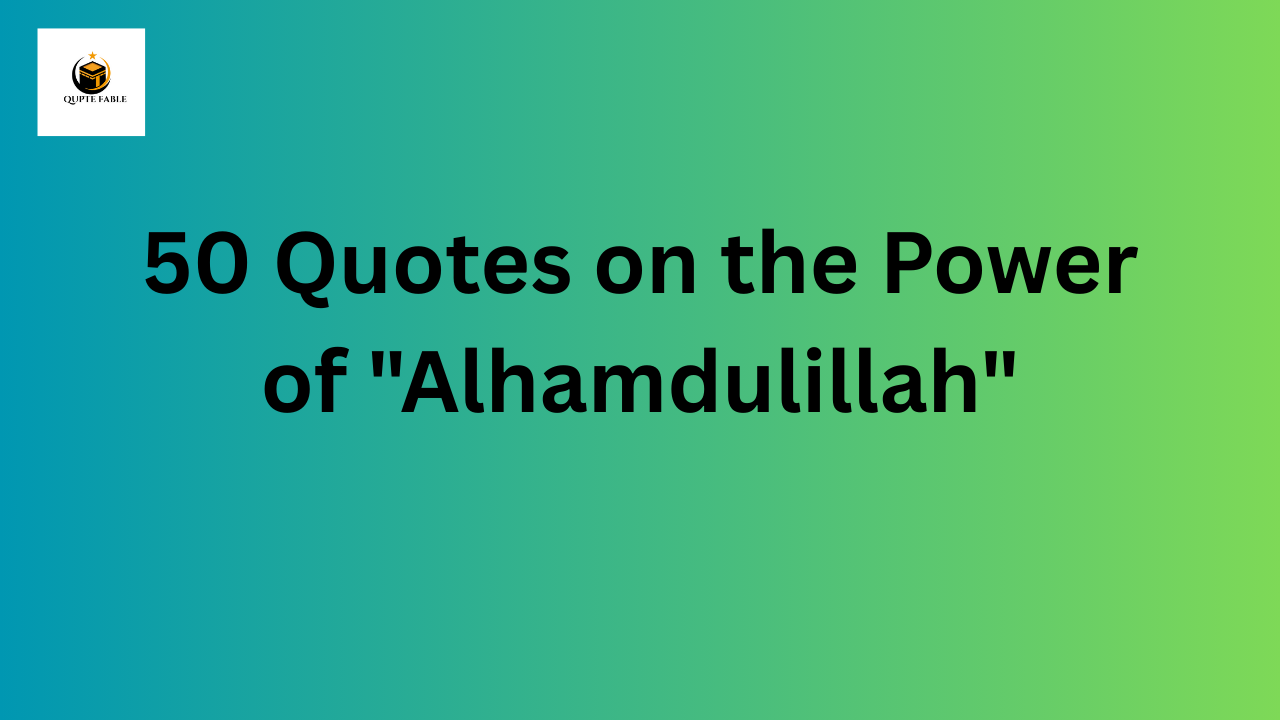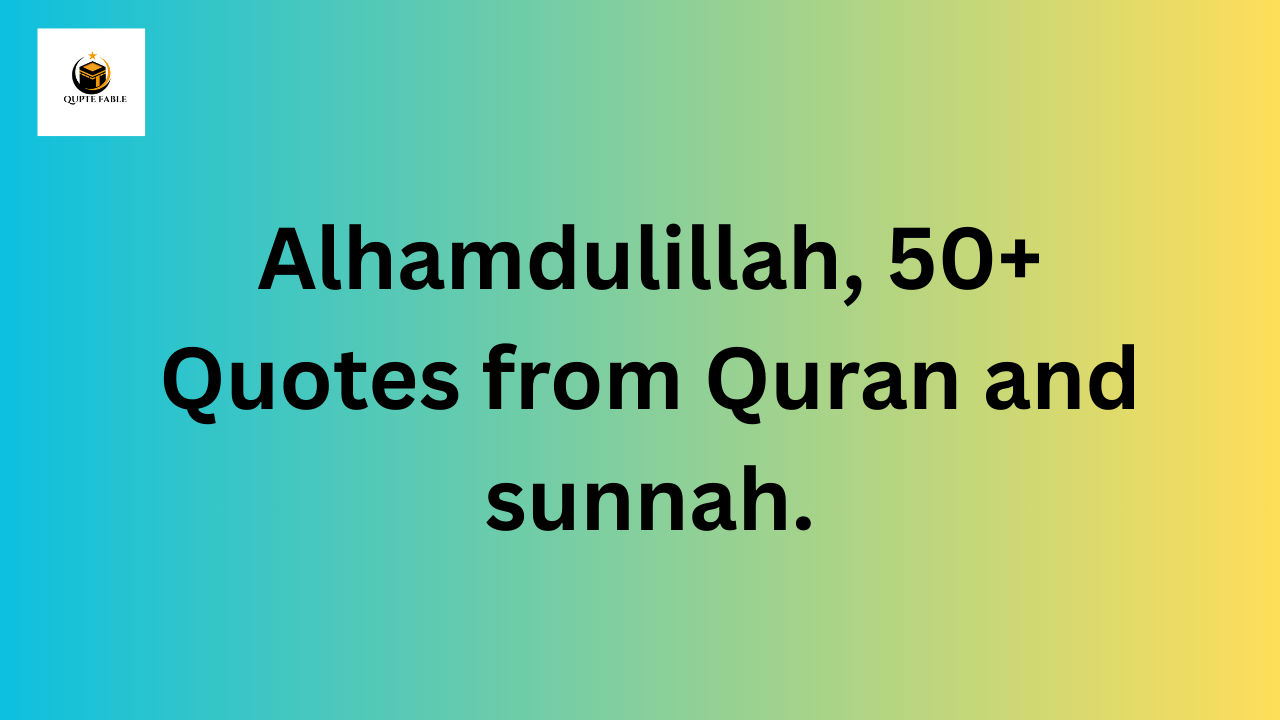Few words in the extensive and exquisite vocabulary of Islamic terms have the same weight, frequency, and deep spiritual meaning as “Alhamdulillah.” It is more than just a catchphrase; it is a way of thinking, an ongoing prayer, and the core manifestation of a believer’s connection to their Creator. This article examines the significance of “Alhamdulillah,” including its linguistic origins, its importance in the Quran and Sunnah, its practical application in everyday life, and the profound wisdom it contains for attaining genuine contentment.

Defining “Alhamdulillah”: More Than Thank You
“The Arabic phrase “Alhamdulillah” (ٱلْحَمْدُ لِلَّٰهِ) is made up of three parts:
Al- (α΄Β): The definite article “the.”
Hamdu (حَمْدُ): This means “praise.” But hamd is a particular kind of commendation. It is affectionate, respectful, and appreciative praise given to someone who has done a favor out of selflessness and generosity. It is neither praise nor flattery for something that is expected.
Li-llāh (لِلَّٰهِ): “To Allah” or “for Allah” is what this means.
Thus, “All praise is for Allah” is the literal translation. However, this straightforward translation only touches the surface. “Alhamdulillah” is a complete affirmation that Allah alone is the object of all thanks, praise, and gratitude. It is a recognition that He is the ultimate source of all blessings, both visible and invisible, no matter how big or small. “Alhamdulillah” is aimed vertically at the Divine, whereas “thank you” (shukran in Arabic) is aimed at people.ecognizing that even the human who did you a favor was simply an instrument of Allah’s will and mercy.
The Pronunciation
For non-native speakers, pronouncing “Alhamdulillah” can seem daunting. A helpful phonetic breakdown is: “Al-ham-du-li-llah.”
- The “h” in “ham” is a heavy, guttural sound originating from the throat.
- The double “l” in “llah” is emphatic, giving weight to the name of Allah.
The effort to pronounce it correctly is itself an act of worship, a conscious attempt to glorify God in the language He chose for the final revelation.
Alhamdulillah in the Quran: The Opening of Divine Wisdom
The significance of “Alhamdulillah” is eternally cemented in the Quran, the divine words of Allah. It is not a casual phrase but the very opening of the Islamic sacred text.
Surah Al-Fatihah (The Opening), Verse 2:
“Alhamdulillahi Rabbil ‘alamin” (ٱلْحَمْدُ لِلَّٰهِ رَبِّ ٱلْعَـٰلَمِينَ)
“All praise is for Allah—Lord of all worlds.”
This is the first verse recited in every unit of every Muslim’s daily prayer (Salah). By beginning the Quran and the prayer with this phrase, Allah teaches humanity the proper perspective on existence: everything begins and ends with praise to the Creator. It establishes that Allah is not just God of the Muslims, but the Rabb (Lord, Sustainer, Nurturer) of all worlds and all creation.
The Quran is replete with this phrase. It is used by prophets, righteous people, and even will be the final call of the people of Paradise:
- Surah Yunus (10:10): “And their call therein will be, ‘Glory to You, O Allah,’ and their greeting therein will be, ‘Peace.’ And the last of their call will be, ‘Alhamdulillahi Rabbil ‘alamin’ (All praise is to Allah, Lord of the worlds).'”
- Prophets like Ibrahim (Abraham), Nuh (Noah), and Sulaiman (Solomon) are depicted using this phrase, anchoring it as a timeless practice of all monotheists.

Alhamdulillah in the Hadith: The Prophetic Practice
The Prophet Muhammad (peace be upon him) embodied the meaning of “Alhamdulillah” and tirelessly encouraged his followers to integrate it into every facet of their lives. His teachings (Hadith) illuminate its transformative power:
- It Fills the Scales of Good Deeds: The Prophet (ﷺ) said, “There are two words that are light on the tongue, heavy on the Scale, and beloved to the Most Merciful: ‘Subhan-Allahi wa bihamdihi, Subhan-Allahil-‘Aẓim’ (Glory and praise be to Allah, Glory be to Allah the Almighty).” (Sahih al-Bukhari) While this includes Tasbeeh, the core is hamd (praise).
- The Best Dua (Supplication): He (ﷺ) said, “The best of remembrance is La ilaha illallah (There is no god but Allah), and the best supplication is Alhamdulillah.” (Sunan Ibn Majah)
- A Sign of Faith: The Prophet (ﷺ) noted that responding to the question “How are you?” with “Alhamdulillah” is a mark of a believer who recognizes blessings.
- After Sneezing: He taught that saying “Alhamdulillah” after sneezing is a right that Muslims have over one another, necessitating the response “Yarhamuk Allah” (May Allah have mercy on you).
- A Comprehensive Thanks: He (ﷺ) said, “Indeed, Allah is pleased with His servant if, when he eats something, he praises Allah for it, or when he drinks something, he praises Allah for it.” (Sahih Muslim)
The Practical Application: When to Say Alhamdulillah
A Muslim is encouraged to weave “Alhamdulillah” into the very fabric of their daily routine. It is a spiritual reflex, cultivated to maintain constant awareness of Allah.
- In Prayer: Recited multiple times in every Rak’ah of Salah.
- After Sneezing: As prescribed by the Sunnah.
- After Eating or Drinking: To express gratitude for sustenance.
- Upon Receiving Good News: To acknowledge Allah as the true source of the blessing.
- In Response to “How are you?”: The ideal response is “Alhamdulillah,” regardless of one’s worldly circumstances.
- Upon Waking Up: Thanking Allah for the gift of another day.
- When Completing a Task: Acknowledging that the ability came from Allah.
- Even in Hardship and Difficulty: This is the highest level of gratitude. A believer says “Alhamdulillah” during trials, not because they enjoy the pain, but because they trust Allah’s wisdom. They are grateful for the chance to have their sins expiated, their patience tested, and their rank raised in the Hereafter. It is the ultimate expression of trust in the divine plan.

50 Quotes on the Power of “Alhamdulillah”
- “Alhamdulillah is not just a word of thanks; it is a worldview of recognizing the divine source of every blessing.”
- “Gratitude is the seed of abundance. Saying Alhamdulillah for what you have invites more blessings into your life.”
- “The highest form of praise is not for what you are given, but for the One who gives. That is the essence of Alhamdulillah.”
- “Say Alhamdulillah in times of ease to show gratitude, and in times of difficulty to show patience and trust in Allah’s plan.”
- “Alhamdulillah is the key to contentment. It shifts your focus from what you lack to the countless blessings you possess.”
- “A heart that constantly says Alhamdulillah has no room for envy, discontent, or arrogance.”
- “Your ‘Alhamdulillah’ in the storm is a beacon of light that guides you back to peace.”
- “The more you say Alhamdulillah, the more you will find to be grateful for.”
- “Alhamdulillah is the believer’s constant refrain, the soundtrack to a life lived in conscious gratitude to the Creator.”
- “True gratitude is to praise Allah for the blessing and for the ability to feel grateful for it. Alhamdulillah for Alhamdulillah.”
- “When you say Alhamdulillah, you are acknowledging that every breath is a gift from the Most Merciful.”
- “Let your first thought in the morning and your last whisper at night be Alhamdulillah.”
- “Alhamdulillah is the simplest prayer and the most profound philosophy.”
- “Don’t just say Alhamdulillah; feel it in your heart, see it in your surroundings, and live it through your actions.”
- “The phrase ‘Alhamdulillah’ is so heavy that it tips the scales of judgment in your favor.”
- “Gratitude turns what we have into enough, and more. Alhamdulillah for everything.”
- “A grateful soul is a magnet for miracles. Start with Alhamdulillah.”
- “In every situation, a believer’s heart finds a reason to say Alhamdulillah.”
- “Alhamdulillah is the antidote to despair. It is the reminder that Allah is in control.”
- “Praise Allah for the seen and the unseen, the known and the unknown. Alhamdulillah.”
- “The journey to Jannah begins with a single, sincere Alhamdulillah.”
- “Your ‘Alhamdulillah’ is a testament to your faith, a declaration that you are a slave of a Merciful Lord.”
- “Even if all you have is your faith, that is enough reason to say Alhamdulillah a thousand times over.”
- “Let gratitude be your attitude. Make Alhamdulillah your default response.”
- “Alhamdulillah for the challenges that made me stronger, the losses that made me wiser, and the blessings that made me grateful.”
- “The sun rises by the command of Allah, and so does our need to say Alhamdulillah.”
- “A life of gratitude is a life of happiness. Alhamdulillah for Islam, the ultimate guide to both.”
- “Do not underestimate the power of a whispered Alhamdulillah in a moment of joy or pain.”
- “Alhamdulillah. For the Quran that guides me, for the Salah that connects me, and for the faith that sustains me.”
- “The word ‘Alhamdulillah’ contains the past, present, and future tense of gratitude all at once.”
- “Thanking people is good manners; thanking Allah is worship. Alhamdulillah.”
- “When you can’t find the words to pray, let ‘Alhamdulillah’ be your heartfelt dua.”
- “Gratitude is not a passive state; it is an active force unleashed every time we say Alhamdulillah.”
- “Alhamdulillah for the mercy of Allah that precedes His wrath, and for His forgiveness that encompasses all sins.”
- “The Prophets taught us to say Alhamdulillah, and the angels record it as a deed of light.”
- “In a world of constant wanting, be a soul of constant thanking. Alhamdulillah.”
- “Your ‘Alhamdulillah’ is a shield against pride, for it reminds you that every achievement is by Allah’s permission.”
- “Alhamdulillah for the eyes to see this message, the mind to comprehend it, and the heart to be moved by it.”
- “The frequency of gratitude attracts the frequency of abundance. Tune your heart to Alhamdulillah.”
- “A home where Alhamdulillah is often heard is a home filled with barakah (blessing).”
- “Start your day with Alhamdulillah, and you have begun it with the best possible intention.”
- “Alhamdulillah for the tests that purify our hearts and bring us closer to our Lord.”
- “The believer is in a constant win-win situation: in ease, he is grateful, and in difficulty, he is patient. Alhamdulillah ‘ala kulli hal.”
- “Let your gratitude be as endless as Allah’s blessings. There will always be a reason to say Alhamdulillah.”
- “Alhamdulillah is the thread that connects all moments of a Muslim’s life into a tapestry of worship.”
- “The greatest wealth is a heart content with what Allah has decreed. And that heart always says Alhamdulillah.”
- “Do not wait for a perfect life to be grateful. Say Alhamdulillah now, and watch your life transform.”
- “Alhamdulillah for the gift of Islam, the ultimate blessing for which we can never be grateful enough.”
- “A single, sincere Alhamdulillah can weigh more than a mountain of gold given in charity without gratitude.”
- “And finally, Alhamdulillah for the ability to say Alhamdulillah.”
Conclusion:
“Alhamdulillah” is far more than a cultural idiom or a religious mantra. It is the foundational pillar of a believer’s existence. It is the lens through which a Muslim views the world—not as a series of random events, but as a divine tapestry woven with blessings, lessons, and mercy. It is a constant, living prayer that nurtures contentment, wards off negativity, and maintains a soulful connection to Allah. By making “Alhamdulillah” a sincere and constant refrain on our tongues and in our hearts, we actively fulfill the very purpose of our creation: to worship and give thanks to the One to whom all praise is due.
please read the related post: The Heart of Divine Mercy of Allah.

